About 40% of cats may deal with anxiety at some point. This is especially true for Maine Coon Cats. Signs include restlessness, too much grooming, or lots of meowing. Figuring out why your cat’s anxious is key to helping them be happy and healthy.
Experts recommend setting up a safe space, keeping routines steady, and adding fun activities. These tactics can really help your Maine Coon feel less stressed. Keep reading to learn how to make your cat’s life more peaceful.
Key Takeaways
- Maine Coon Cats can display anxiety through restlessness, overgrooming, or increased vocalizations.
- Anxiety in Maine Coons can stem from environmental changes or underlying health issues.
- A safe haven provides a secure and comforting environment for anxious Maine Coons.
- Consistency in feeding, playing, and resting times helps manage stress.
- Enrichment activities like interactive toys and puzzle feeders can alleviate anxiety.
- Professional guidance from veterinarians is essential for tailored anxiety relief strategies.
Understanding Maine Coon Anxiety

Maine Coons can get anxious, much like other cats. It’s key to know what causes their anxiety. This way, you can help them better.
We’ll look at what often makes them anxious. And, we’ll see how to spot if your Maine Coon is anxious.
Common Causes of Anxiety in Maine Coons
Issues in their environment or health problems can cause Maine Coon anxiety. Major changes or sickness might lead them to become anxious.
- Environmental Shift: Moving homes or even rearranging furniture can unsettle your Maine Coon.
- Health Issues: Conditions like feline lower urinary tract disease may also contribute to anxiety levels.
- Past Experiences: Negative early life experiences can lead to long-lasting anxiety.
Signs and Symptoms of Anxiety
It’s vital to catch anxiety signs early. Here’s what to look out for:
- Hiding or Escapism: If your cat is always hiding, it could be anxious.
- Aggression: If they start acting mean, it might be due to stress.
- Changes in Grooming: Too much or too little grooming can be a warning sign.
Using vet-approved methods for calming is key. The right steps can make your Maine Coon feel safe and happy.
Behavioral and Physical Signs of Maine Coon Anxiety

Being able to spot early anxiety signs in your Maine Coon is key. It ensures your cat gets the right care on time. Anxiety in these big cats shows up in what they do and how they look. So, keeping an eye out is important.
Behavioral Signs
Behavioral signs tell us a lot about how your Maine Coon might feel. A big one is grooming too much. This can cause bald spots and itchy skin. Here are a few other signs:
- Hiding
- Increased vocalization
- Escapism
- Aggression towards other pets or humans
Your cat might start doing things it never did before. Like spraying or avoiding the litter box.
Physical Signs
Physical signs of anxiety in your Maine Coon might be easier to miss. But they are just as important. Look out for things like:
- Dilated pupils
- Tail-tucking
- Trembling
- Changes in appetite
Seeing these early can help you act fast. This can make a real difference in how your Maine Coon feels.
Creating a Safe Haven for Your Cat
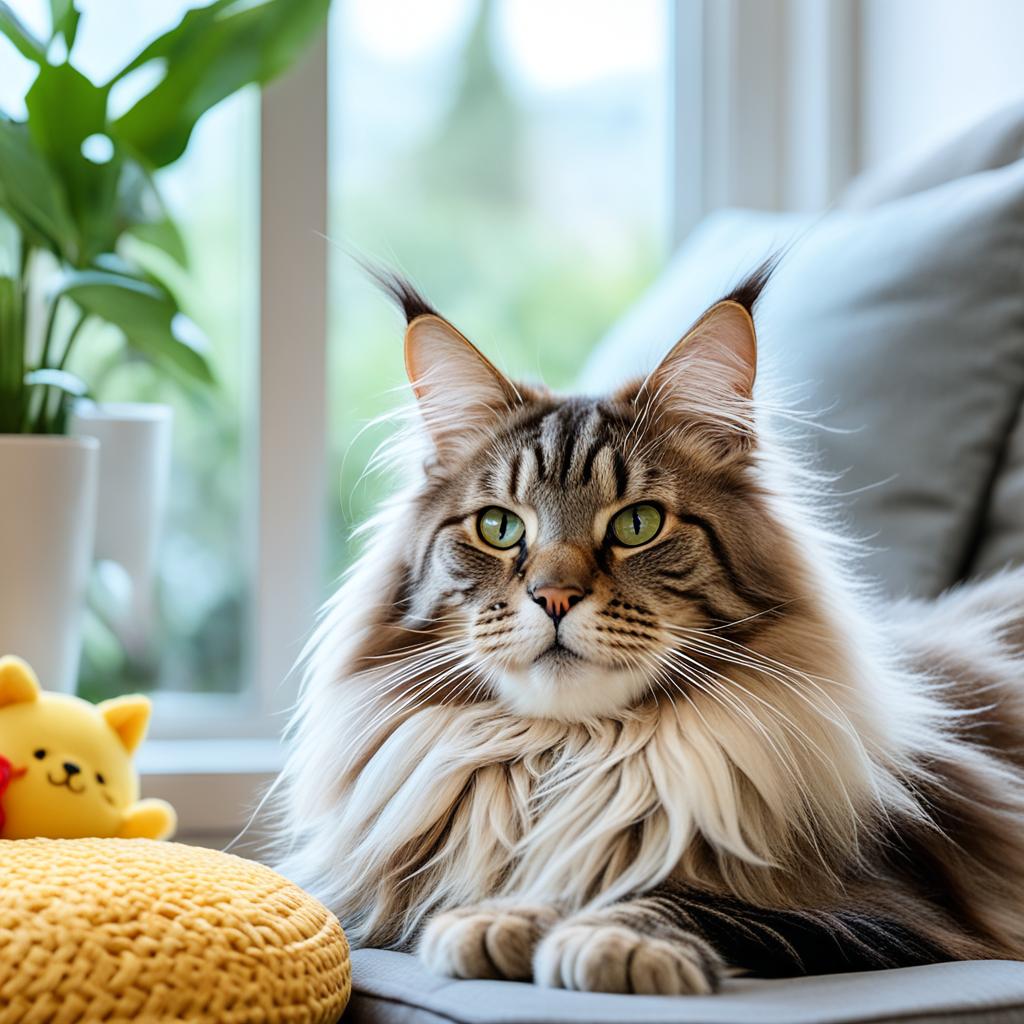
Creating a safe space is key for a Maine Coon Cat stress management. Add cozy bedding, tall perches, and liked toys. This corner should be quiet, reducing stress for your cat.
- Choose a calm, quiet spot away from busy areas.
- Place soft and comfy bedding for your cat.
- Install shelves or high perches for climbing fun.
- Stock up on playthings and comforting toys.
By doing these, you can lower your cat’s stress and boost their happiness. This will help your Maine Coon feel calm and thrive.
Establishing Consistent Routines
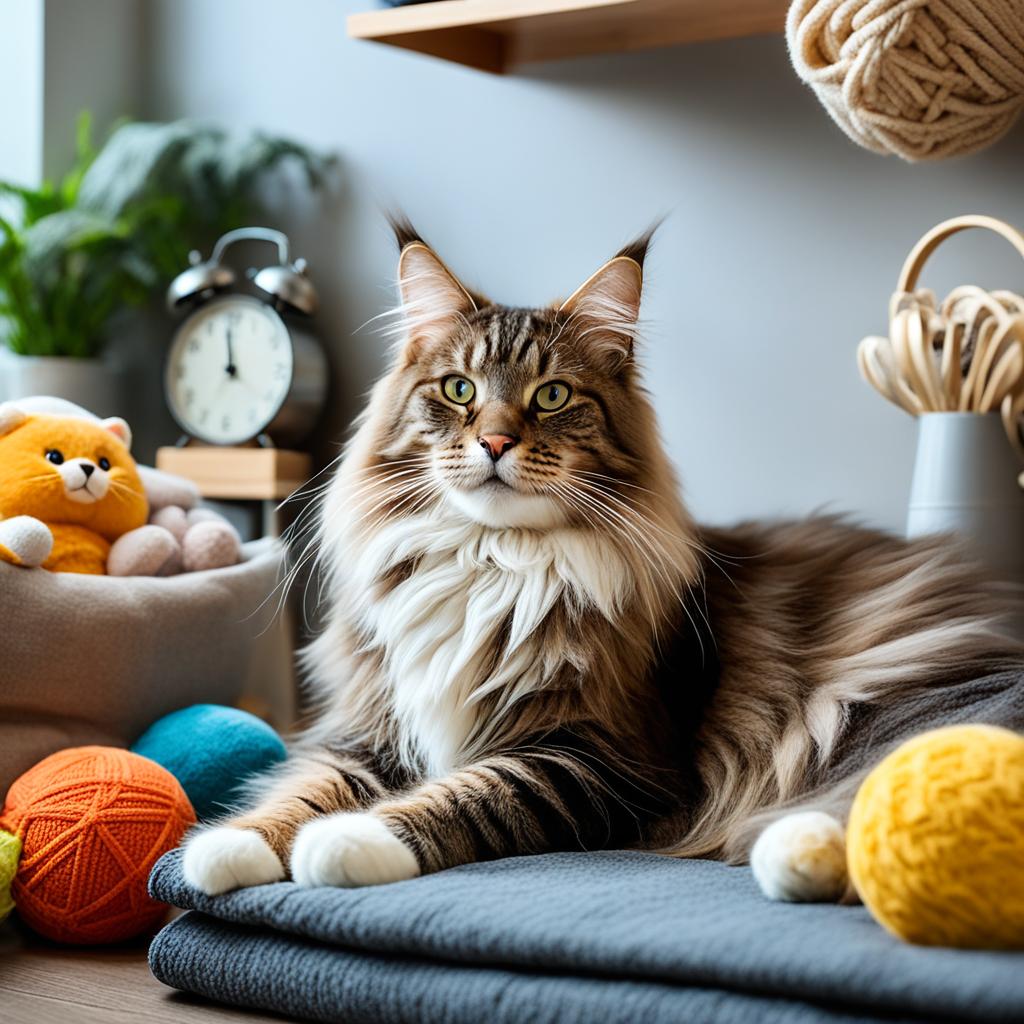
Think about how your Maine Coon’s life could change. Simple and consistent routines can bring big improvements. Having set times for eating, playing, and resting can lower stress levels. This routine gives your cat a safe feeling, knowing what to expect everyday.
These are some game-changing tips to help with Maine Coon Cat anxiety. They include soothing routines:
- Regular Meal Times: Feed your cat at the same times daily. This helps your cat feel secure and less stressed about food.
- Dedicated Play Sessions: Play with your cat at specific times. It helps use up their energy and keeps them happy.
- Consistent Rest Periods: Make sure your cat has quiet time for resting. This allows them to relax and recharge.
Adding these Maine Coon Cat calming techniques to your day can work wonders. It reduces anxiety and improves your pet’s health. You can use a routine calendar to stay organized:
| Activity | Time | Benefits |
|---|---|---|
| Feeding | 8 AM & 6 PM | Predictability reduces food-related anxiety |
| Playtime | 10 AM & 4 PM | Engages mind and body, easing restlessness |
| Rest Period | 12 PM – 2 PM | Provides necessary downtime for relaxation |
Using Pheromone Therapy for Calming Effects
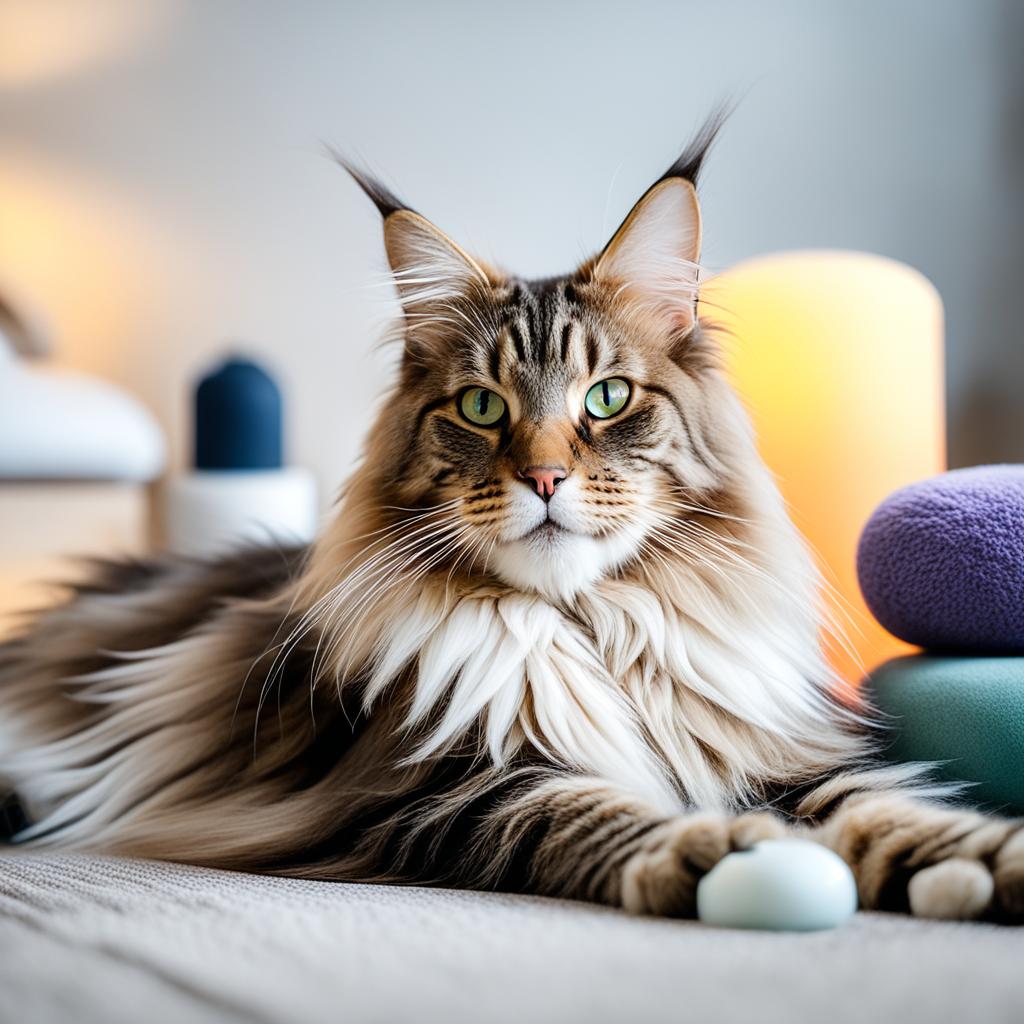
Dealing with an anxious Maine Coon can be tough. But, *did you know* pheromone therapy can help? These products copy the calming scents mother cats use. Their goal is to make your pet feel safe.
Imagine placing a special diffuser in your living room. It releases pheromones your Maine Coon finds familiar. This makes the space feel secure for them. It’s like bringing their safe space right into your home.
Curious about how to use Maine Coon Cat anxiety remedies every day? Here’s a handy guide:
| Product Type | Usage | Benefits |
|---|---|---|
| Diffuser | Plug into an outlet | Continuous, discreet release of pheromones |
| Spray | Apply to bedding or favorite lounging areas | Targeted application for immediate calming effects |
| Collar | Worn around the cat’s neck | Constant, mobile source of comfort |
Always check with a vet before using any pheromone therapy item. Safety is key! These remedies can help calm both you and your cat. It’s a win-win for peace of mind.
Adding Enrichment Activities for Mental Stimulation
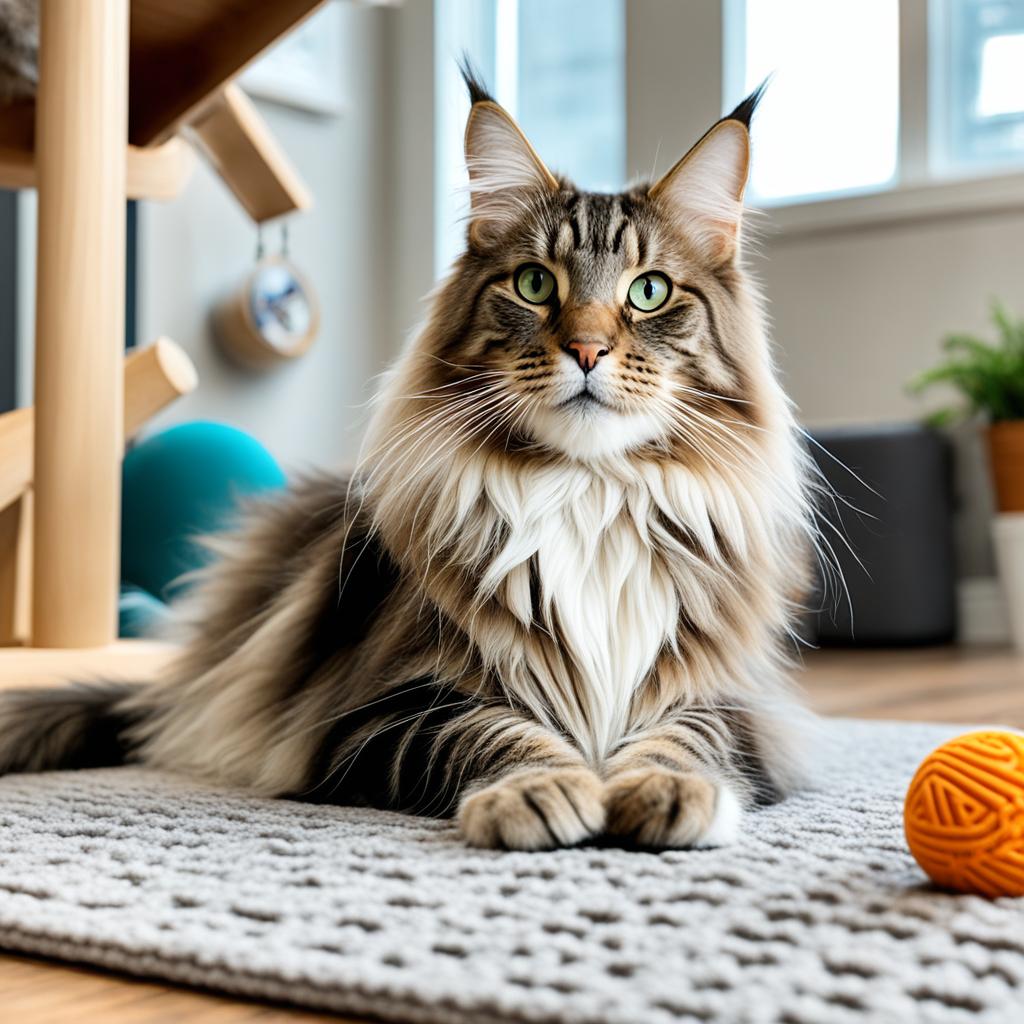
Being bored often makes Maine Coons anxious. You can help reduce this anxiety by giving them enrichment activities to do. This includes using interactive toys, puzzle feeders, and having play times.
Make your Maine Coon move and think with toys like feather wands and laser pointers. Puzzle feeders mix mealtime with a brain workout. Your cat will love the challenge and it will slow down its eating too.
Play time is key in keeping your Maine Coon happy and less anxious. Try different toys to keep them interested. Having new toys and games prevents boredom. This doesn’t just keep them mentally healthy, but it strengthens your bond too.
By using these tips, your cat will be happier and more mellow. Remember, a cat that’s well-entertained is a happy one!
How to Deal with Maine Coon Cat’s Anxiety?
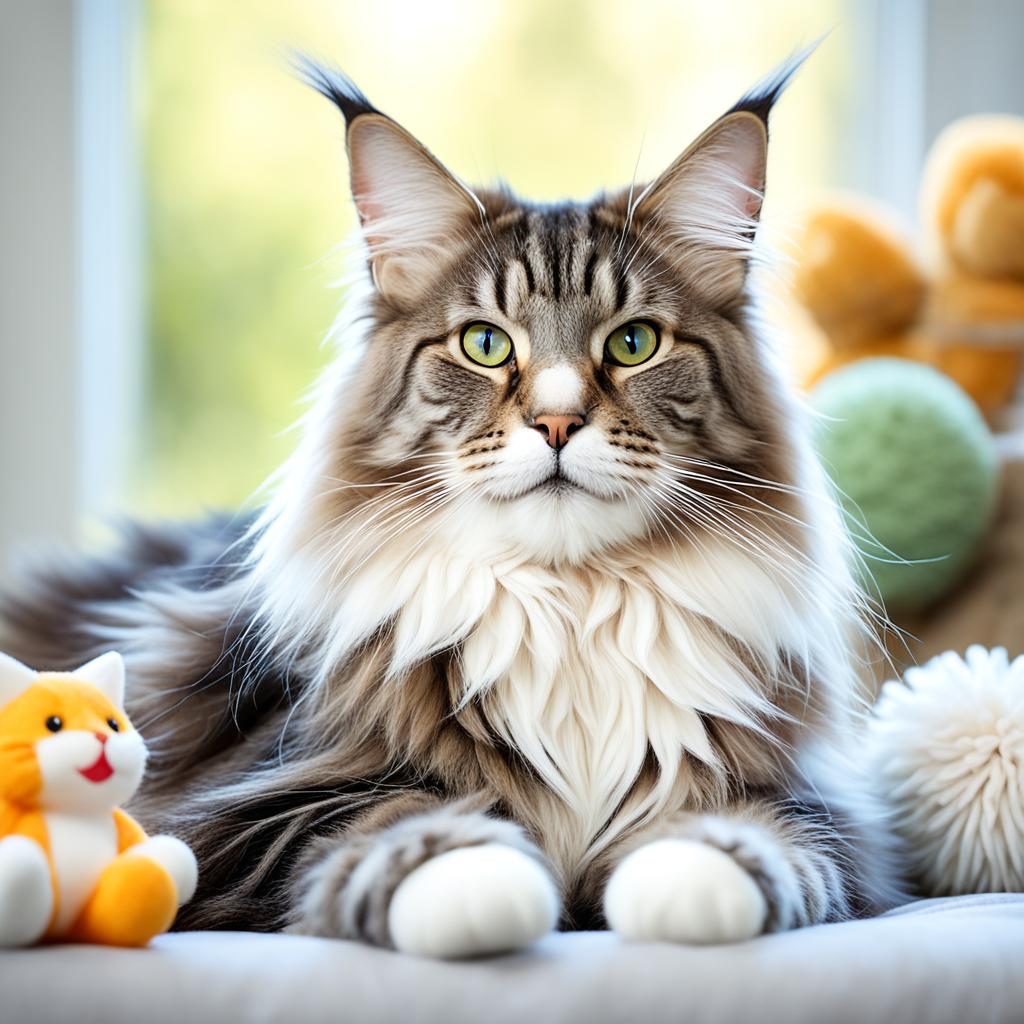
Is your Maine Coon acting anxious? It’s challenging, but there’s hope. You can make your cat feel better. Working with experts and changing how your home is set up are big helps.
Consulting with a Veterinarian
At first, talk to a vet about dealing with Maine Coon Cat’s anxiety. They can find if there are any health issues making your cat stressed. A full check-up looks for things like the feline lower urinary tract disease, a common cause of anxiety in cats. A vet’s insight helps avoid missing critical health signs.
Behavioral Modification Techniques
After checking health concerns, focus on behavior. Maine Coon Cat behavioral modificationacts are a game changer. Experts suggest changes like making the home more cat-friendly. Sometimes, medicine might be needed. These methods will make your Maine Coon happier and less anxious.
These steps are crucial for dealing with Maine Coon Cat’s anxiety. They lead to your cat’s happiness and health.
Recognizing and Reducing Triggers of Anxiety
Have you ever seen your Maine Coon cat acting nervously? Maybe it hides under furniture when things change at home. Big changes like renovations or new family members can cause major anxiety. It’s key to spot these stressors to make a safe place for your cat. Watch your cat closely and get to know its actions. Then, you can work to lower stressful situations.
Being proactive is a great strategy. If your cat meows more or acts restless with changes, help it find a quiet spot. Put things there that it knows. This makes your pet feel safe in a changing world. So, Maine Coon Cats won’t get as stressed with each new thing that happens.
Doing little things can also go a long way in helping your feline friend. When moving furniture, do it slowly. When adding a new pet or family member, give your Maine Coon time to get used to them. By always looking out for and easing stress triggers, you make a peaceful space. This is a space where your cat can feel at ease and loved, just the way it needs.




